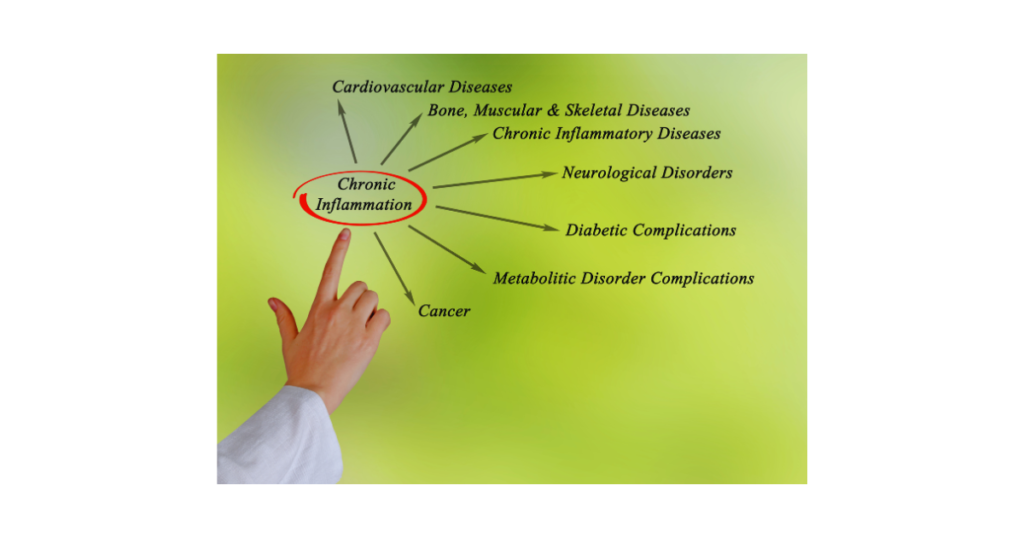Inflammation is an essential biological process that serves as the body’s natural defense mechanism. It helps protect against infections, heal injuries, and neutralize toxins. However, when inflammation becomes chronic, it can contribute to persistent pain and long-term health challenges. Understanding inflammation is the key to harnessing its healing power while preventing its damaging effects.
In this blog, we will explore the science of inflammation, its role in the body, and actionable strategies to boost healing and manage chronic pain effectively. Whether you’re managing a chronic condition or seeking to enhance your overall health, this guide will provide valuable insights.
What is Inflammation?
Inflammation is the body’s natural response to injury or infection. When the immune system detects harmful invaders like bacteria, viruses, or damaged tissues, it activates a defense mechanism. This leads to visible signs like redness, swelling, warmth, pain, and sometimes loss of function. These symptoms are signals that the body is working to protect itself and begin the healing process. While essential for recovery, it can sometimes become harmful if it persists or happens excessively, leading to chronic conditions.
There are two primary forms :
- Acute Inflammation is a short-term response that happens immediately after an injury or infection. It is the body’s first line of defense, quickly mobilizing resources to fight harmful invaders and begin the healing process. Common signs include redness, warmth, swelling, and pain. For example, when you sprain your ankle, the affected area becomes swollen and tender as the body works to repair the damage.
- Chronic Inflammation is long-lasting and can persist for months or even years. Unlike acute, it is a low-grade, ongoing condition that may be triggered by factors such as autoimmune disorders, unresolved infections, or lifestyle habits like poor diet and lack of exercise. Over time, chronic can lead to serious health problems, contributing to diseases such as rheumatoid arthritis, heart disease, and type 2 diabetes. This type of often occurs without noticeable symptoms but can cause significant damage to the body if left untreated.
How Does Inflammation Work?
It’s begins when the immune system detects harmful stimuli and initiates a series of responses:
- Detection: Immune cells recognize damage or infection and release signaling molecules called cytokines.
- Activation: Blood vessels dilate to increase blood flow to the affected area, delivering oxygen, nutrients, and immune cells.
- Repair: White blood cells, such as neutrophils and macrophages, remove damaged cells and pathogens.
- Resolution: Anti-inflammatory signals deactivate the response, allowing tissue repair to complete.
When this process is well-regulated, promotes healing. However, unresolved or excessive it can harm healthy tissues and contribute to chronic pain and diseases.
Chronic and Its Impact :

Chronic occurs when the immune system remains activated without a clear threat. This prolonged state can damage tissues, disrupt organ function, and exacerbate pain.
- Rheumatic Diseases: Conditions like rheumatoid arthritis and lupus involve chronic, leading to joint damage and systemic complications.
- Metabolic Disorders: Chronic inflammation is a significant factor in obesity, insulin resistance, and type 2 diabetes.
- Neurological Effects: Persistent inflammation has been linked to depression, anxiety, and neurodegenerative diseases.
- Cardiovascular Risk: Inflammatory markers like C-reactive protein (CRP) are associated with heart disease and stroke.
Common Causes of Chronic Inflammation :
To address chronic effectively, it is crucial to understand its triggers:
- Diet: High intake of processed foods, refined sugars, and trans fats can fuel inflammation.
- Stress: Chronic stress releases cortisol, which can dysregulate the immune system.
- Sedentary Lifestyle: Physical inactivity contributes to inflammatory conditions like obesity.
- Environmental Factors: Pollution, allergens, and toxins can trigger immune responses.
- Infections: Persistent infections, such as gum disease or viral illnesses, can lead to chronic.
- Autoimmune Reactions: In autoimmune diseases, the immune system attacks healthy tissues, causing ongoing inflammation.
Common Symptoms :
Recognizing chronic can help in early diagnosis and management. Common signs include:
- Persistent fatigue
- Joint and muscle pain
- Low-grade fever
- Digestive issues like bloating or constipation
- Brain fog or memory problems
Strategies to Boost Healing and Fight Chronic Pain
Effective management of inflammation involves both medical and lifestyle interventions. Here are actionable steps to promote healing and reduce pain:
- Adopt an Anti-Inflammatory Diet:
- Emphasize whole, nutrient-dense foods like leafy greens, berries, fatty fish, and nuts.
- Limit pro-inflammatory foods, such as sugary drinks, processed snacks, and red meat.
- Stay Physically Active:
- Regular exercise reduces and enhances joint mobility.
- Low-impact activities like swimming, yoga, and walking are especially beneficial.
- Manage Stress:
- Chronic stress amplifies. Techniques like mindfulness, meditation, and deep breathing can help.
- Prioritize Sleep:
- Aim for 7-8 hours of quality sleep nightly. Poor sleep increases inflammatory markers in the body.
- Use Medications Wisely:
- Nonsteroidal anti-inflammatory drugs (NSAIDs) and corticosteroids can provide temporary relief. Consult your doctor for appropriate use.
- Explore Natural Remedies:
- Supplements like turmeric (curcumin), omega-3 fatty acids, and green tea have anti-inflammatory properties. Always discuss with a healthcare provider before starting any supplement.
- Seek Professional Guidance:
- Work with a rheumatologist or specialist to develop a personalized treatment plan, especially if dealing with autoimmune or chronic inflammatory conditions.
FAQs:
1. Is inflammation always bad?
No, inflammation is a vital defense mechanism that helps the body heal. However, chronic inflammation can lead to harmful health effects and requires medical attention.
2. What are the best foods to reduce inflammation?
Foods like salmon, berries, spinach, walnuts, and olive oil are excellent for combating inflammation. Avoid processed and sugary foods.
3. Can stress cause inflammation?
Yes, chronic stress triggers the release of stress hormones, which can promote inflammatory responses.
4. How is inflammation diagnosed?
Doctors use blood tests like C-reactive protein (CRP) and erythrocyte sedimentation rate (ESR) to measure levels. Imaging tests may also detect in joints and tissues.
5. When should I see a rheumatologist?
If you experience persistent joint pain, swelling, or stiffness that doesn’t improve, consult a rheumatologist for evaluation and treatment.
6. How long does acute inflammation last?
Acute is short-term and typically resolves within a few days to weeks, depending on the severity of the injury or infection.
Conclusion
Inflammation is a powerful tool that helps the body heal, but when it becomes chronic, it can lead to debilitating pain and illness. By understanding the triggers and symptoms of inflammation, you can take proactive steps to manage it effectively. From dietary changes to stress management and professional care, numerous strategies can help you harness the benefits of inflammation while minimizing its downsides.





